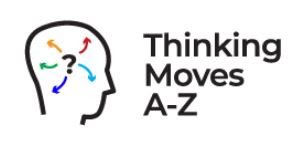School Improvement Liverpool
Thinking Moves Case Study
School Improvement Liverpool (SIL) supports educational settings to enable children and young people to be safe, develop, learn and achieve. To this end, we have developed a collaboration with Dialogue Works with a view to enhancing academic progress, especially for lower attaining and disadvantaged students.
In 2020 SIL took their first steps by training teachers from 20 settings in the understanding and implementation of the TM A-Z framework. However, covid and the lockdown hampered the success of this project, despite some early positive feedback.
When in 2021, Liverpool City Council produced their Education Improvement Plan, priority 1 was to Ensure the mental health and emotional wellbeing of children and young people are supported in order that they can flourish in their education - included the use of metacognition to support wellbeing.
We explored how Thinking Moves A-Z can be used not only to support learning, but also to self-regulate and therefore enable young people to lead healthier and more ambitious lives in which they can truly thrive.
Training
There have been 7 cohorts so fa which have centred on one learning network in the city, and then spring and summer terms as advertised will be open for delegates from across the city.
We have welcomed delegates from nursery, primary, secondary and special schools.
Impact
Pupils are learning Thinking Moves and are able to identify what metacognitive process needs to be used to complete the task independently. Also…
Pupils are more confident to speak
Articulating thought processes more.
Linking thoughts, feelings and behaviour
Talking partners more effective.
Improved oracy skills.
In RSHE, attainment between PP and Non PP indicates PP children are making more progress.
In RSHE 2022-23, the gap between SEND and Non SEND is narrowing.
In RSHE, boys are making more progress than girls. From comparable topic (New Beginnings) in previous year, the gap was -29.2%, this is now +11.11% which shows that boys have not only narrowed the gap, they are now exceeding the girls in their cohort. From comparable topic (Say no to Bullying) in previous year, the gap was -
19.4%, this is now +10.71%which shows that the boys have not only narrowed the gap, they are now exceeding the girls in their cohort.
In comparing EAL children within New Beginnings topic from academic year 2021-22 -
2022-23, an increase of 38.1% was recorded. In the Say no to Bullying topic, the comparable data from 2021-2022 -2022/23 showed an increase of 24.21%.
This data does not allow for mobility of children within the year group.
The future
Schools and teachers have long understood the benefits of metacognition, but grappled with how best to convey an understanding of it to the children and young people they teach, or indeed to fully formulate their own comprehension of the term and its application. TM A-Z has taken the concept and made it comprehensible for children and teachers alike to enable them to understand, identify and select appropriate thinking processes from the 26 moves, or combinations of them in the form of thinking grooves. Initial findings have shown that mastering and using the moves supports learning across the curriculum for all children, but has an especially significant positive impact on those children who find learning more difficult to decrypt. Children have spoken about the process of dividing or chunking learning into moves to enable them to work through the required processes and how this has made learning more manageable.
The challenge is to ensure consistency of practice and constancy throughout schools so that TM is not something that only benefits children in one particular year or in a certain school, but is a city-wide approach. The ambition within Liverpool is for each school to have a TM lead teacher who supports its implementation so that children have the opportunity to build on their understanding year on year and ensures that it continues to be prioritised. This would mean that children moving between schools would continue to access TM whatever their year group and whichever setting they attended in the city.
The end result of this would be children and young people who go out into the world who are more thoughtful, reflective and have greater agency in their lives. Indeed, while we would hope to see results in the short term, the long-term impact may be felt in years hence.




